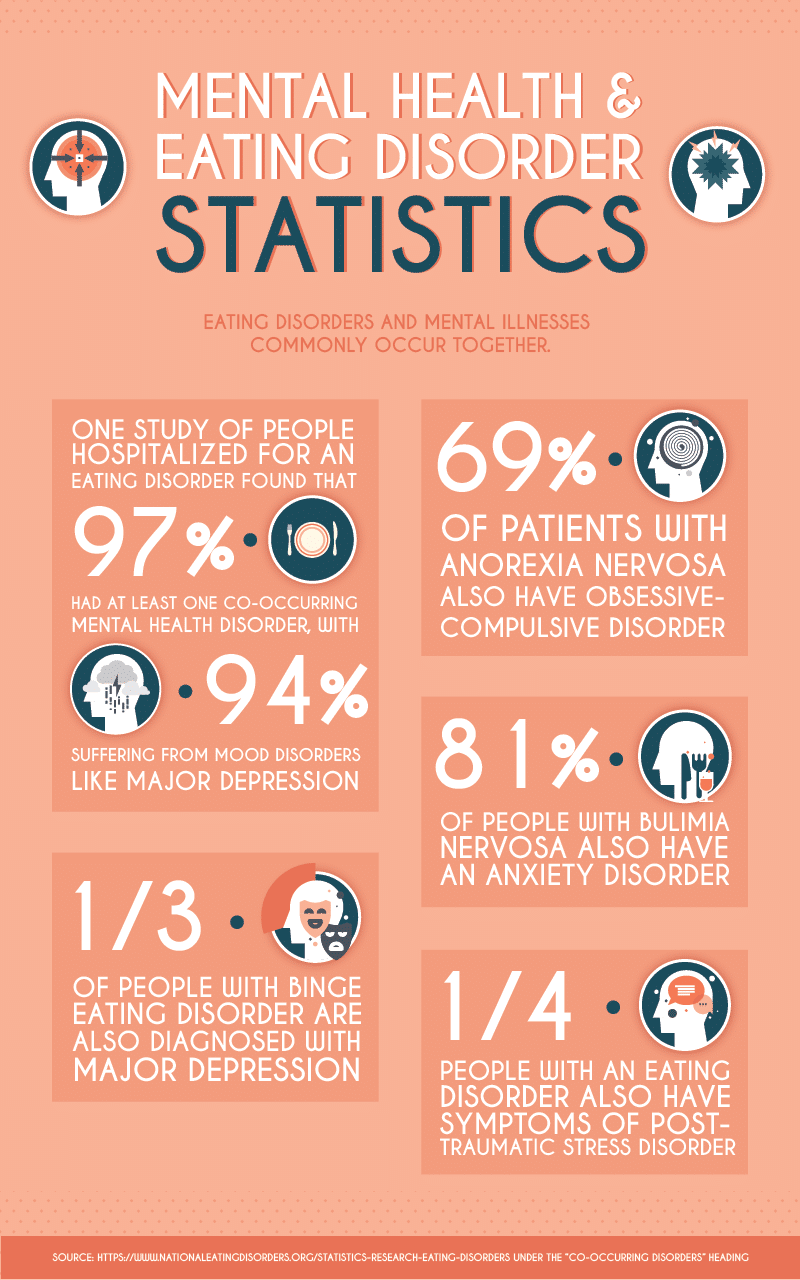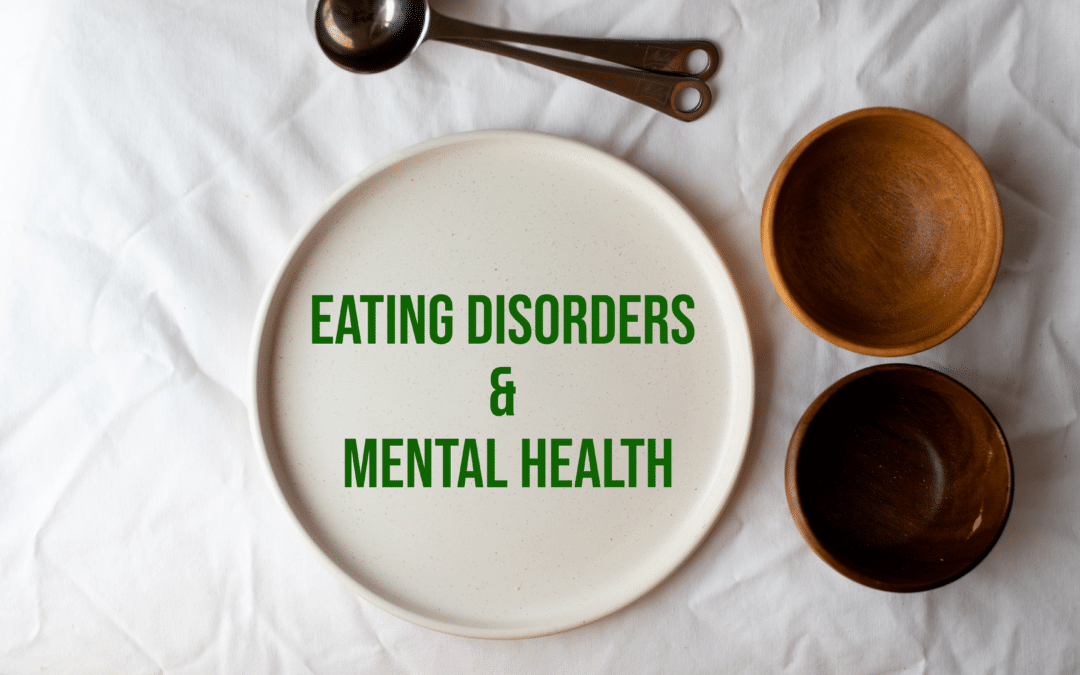What are eating disorders?
An eating disorder is a mental illness. You will use food to try to manage your feelings. If you have an eating disorder you will have an unhealthy relationship with food. This may be eating too much or too little food. Or eating a lot of food in one sitting. You may become obsessed with food and your eating patterns if you have an eating disorder.
Anyone can develop an eating disorder. It doesn’t matter what your age, gender, cultural or racial background is.
Possible Symptoms of Eating Disorders
The National Eating Disorders Association lists a series of possible symptoms related to eating disorders. Some physical manifestations of an eating disorder may include:
- Constantly feeling cold
- Fainting
- Issues with one’s sleep
- Cuts and/or calluses across the top of finger joints, which could suggest inducing vomiting
- Noticeable fluctuations (both up and down) of weight
- Difficulties concentrating
- Dizziness, particularly when one stands up
- Menstrual irregularities, such as missed periods or only experiencing a period when on hormonal contraceptives
- Stomach cramps and other non-specific gastrointestinal issues such as constipation and acid reflux
- Muscle weakness
- Poor wound healing
- Abnormal laboratory results such as low hormone levels, anemia, low white and red blood cell counts, and low potassium
- Brittle nails
- Impaired immunity
- Dry hair and skin
- Fine hair on one’s body
- Yellow skin (could be in the context of eating large amounts of carrots)
- Swelling of feet
- Swelling around the salivary glands
- Discoloration of teeth and cavities, which may result from vomiting
- Cold, mottled hands
Common behavioral and emotional signs of eating disorders may include:
- A preoccupation with calories, food, weight, fat grams, carbohydrates, and dieting
- Recurrent dieting
- Appearing uncomfortable eating around other people
- Taking small portions of food at regular meals
- Behaviors and attitudes that point towards dieting, weight loss, and control of food becoming major concerns for an individual
- Extreme mood swings
- Skipping meals
- Excessive chewing
- Great concern with one’s body shape and size
- Frequent checks in the mirror for supposed flaws in their appearance
- Withdrawal from friends
- Withdrawal from usual activities
- The refusal to eat specific foods, which can progress to restrictions against entire food groups (i.e. no carbohydrates)
- Food rituals (only eating a particular food group or food)
- Not allowing certain foods to touch

What are the common types of eating disorders?
Common eating disorders include anorexia nervosa, bulimia nervosa, binge-eating disorder, and avoidant restrictive food intake disorder. Each of these disorders is associated with different but sometimes overlapping symptoms. People exhibiting any combination of these symptoms may have an eating disorder and should be evaluated by a health care provider.
What is anorexia nervosa?
Anorexia nervosa is a condition where people avoid food, severely restrict food, or eat very small quantities of only certain foods. They also may weigh themselves repeatedly. Even when dangerously underweight, they may see themselves as overweight.
There are two subtypes of anorexia nervosa: a restrictive subtype and a binge-purge subtype.
Restrictive: People with the restrictive subtype of anorexia nervosa severely limit the amount and type of food they consume.
Binge-Purge: People with the binge-purge subtype of anorexia nervosa also greatly restrict the amount and type of food they consume. In addition, they may have binge-eating and purging episodes—eating large amounts of food in a short time followed by vomiting or using laxatives or diuretics to get rid of what was consumed.
Anorexia nervosa can be fatal. It has an extremely high death (mortality) rate compared with other mental disorders. People with anorexia are at risk of dying from medical complications associated with starvation. Suicide is the second leading cause of death for people diagnosed with anorexia nervosa.
What is bulimia nervosa?
Bulimia nervosa is a condition where people have recurrent episodes of eating unusually large amounts of food and feeling a lack of control over their eating. This binge eating is followed by behaviors that compensate for the overeating to prevent weight gain, such as forced vomiting, excessive use of laxatives or diuretics, fasting, excessive exercise, or a combination of these behaviors. Unlike those with anorexia nervosa, people with bulimia nervosa may maintain a normal weight or be overweight.
What is binge-eating disorder?
Binge-eating disorder is a condition where people lose control of their eating and have reoccurring episodes of eating unusually large amounts of food. Unlike bulimia nervosa, periods of binge eating are not followed by purging, excessive exercise, or fasting. As a result, people with binge-eating disorder are often overweight or obese.
What is avoidant restrictive food intake disorder?
Avoidant restrictive food intake disorder (ARFID), previously known as selective eating disorder, is a condition where people limit the amount or type of food eaten. Unlike anorexia nervosa, people with ARFID do not have a distorted body image or extreme fear of gaining weight. ARFID is most common in middle childhood and usually has an earlier onset than other eating disorders. Many children go through phases of picky eating, but a child with ARFID does not eat enough calories to grow and develop properly, and an adult with ARFID does not eat enough calories to maintain basic body function.
How can I get diagnosed with an eating disorder?
A person with an eating disorder will have the best recovery outcome if they receive an early diagnosis. If an eating disorder is believed to an issue, a doctor will usually perform a physical examination, conduct an interview and order lab tests. These will help form the diagnosis and check for related medical issues and complications.
In addition, a mental health professional will conduct a psychological evaluation. They may ask questions about eating habits, behaviors and beliefs. There may be questions about a patient’s history of dieting, exercise, bingeing and purging.
Symptoms must meet the criteria in the Diagnostic and Statistical Manual of Mental Disorders (DSM) in order to warrant a diagnosis. Each eating disorder has its own diagnostic criteria that a mental health professional will use to determine which disorder is involved. It is not necessary to have all the criteria for a disorder to benefit from working with a mental health professional on food and eating issues.
Often a person with an eating disorder will have symptoms of another mental health condition that requires treatment. Whenever possible, it is best to identified and address all conditions at the same time. This gives a person comprehensive treatment support that helps insure a lasting recovery.
Types of Treatment Options for Eating Disorders
Eating disorders are managed using a variety of techniques. Treatments will vary depending on the type of disorder but will generally include the following.
- Psychotherapy,such as talk therapy or behavioral therapy.
- Medicine,such as antidepressants and anti-anxiety drugs. Many people living with an eating disorder often have a co-occurring illness like depression or anxiety, and while there is no medication available to treat eating disorders themselves, many patients find that these medicines help with underlying issues.
- Nutritional counseling and weight restoration monitoringare also crucial. Family-based treatment is especially important for families with children and adolescents because it enlists the families’ help to better insure healthy eating patterns, and increases awareness and support.
While eating disorders can be very complex and hard to treat, many effective treatment interventions are currently helping many people fully recover from their eating disorders. We here at New Roads Behavioral Health work closely with Center For Change, a treatment center that specializes in eating disorder treatment. If you’d like to learn more about how New Roads Behavioral Health works with CFC as well as treating co-occurring disorders like anxiety, depression, and trauma, please reach out to us for more information. We are here to help.

